Out of respect for privacy, Modern Farmer will not disclose the last names of some community fridge users.
In less than 10 minutes, no less than five people opened the refrigerator door and the bright yellow community pantry just outside. Medlock Park Neighborhood in Decatur, Georgia. Most people come here for fresh food and produce, or personal products like toothpaste or diapers donated by the community.
“I come here about three times a week,” Anne said. She relies on food, especially fresh produce, to supplement her diet. “Without this fridge, I definitely wouldn’t be able to eat as healthily as I do now,” she said. “It’s so wonderful when people donate.”
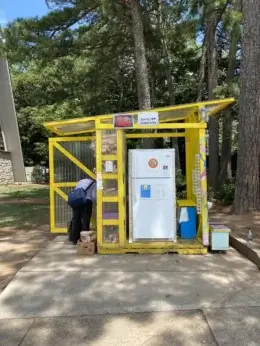

ATLFreeFridge. Photo by author.
Community refrigerators, known as Free ATL Refrigeratorstand in front of North Decatur Presbyterian Church. The goal is to provide free food and helps reduce food waste. It is open 24 hours a day, seven days a week, and anyone can pick up or donate food.
The ATLFreeFridge is one of six refrigerators installed in 2020 as part of a volunteer initiative Free99 Refrigerator was started by Atlanta native and activist Latisha Springer, whose goal was to establish community refrigerators and pantries throughout the Atlanta metropolitan area to help combat food insecurity and waste. (Springer ran the program until she left Atlanta to pursue other opportunities.) Initially, all of the refrigerators were successful.
But unlike the refrigerator at the church, the others depend on local businesses such as coffee shops and breweries for space and electricity. When Springer left the program, the refrigerator sponsors had to choose between keeping the refrigerator or closing it. Only North Decatur Presbyterian Church chose to keep its refrigerator, renaming it ATLFreeFridge.
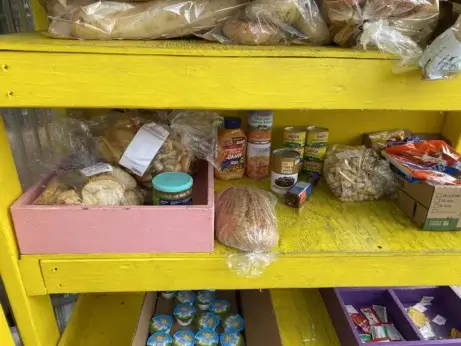

ATLFreeFridge. Photo by author.
Today, volunteers install, clean, and monitor the ATLFreeFridge. They collect donations of food, cleaning supplies, and dry goods, and make sure none of the food is expired or spoiled. Most of the fresh food comes from the surrounding community, although a team of volunteers coordinates food pickups from local restaurants, farms, and grocery stores, which also provide tons of fresh food.
“It was a new idea here when I first heard about it,” Monique said. “It was unusual because it was a mutual aid project rather than a non-profit. It was very smart and done with respect. There was no question about whether you were donating or coming to pick up food.”


But Medlock Park neighbors had plenty of questions from the start. They raised concerns with the church and volunteer coordinators about things like sanitation, people lingering by the refrigerators, and shelters starting to show up. But most of the reservations were about safety concerns around the neighborhood. Those concerns became more acute in 2022 after a man who appeared to be having a mental health crisis. throw the contents of the fridge out on the streetsome in passing cars.
That’s why, says Nancy Gathany, a church member on the ATLFreeFridge executive committee, the church went to great lengths to keep the refrigerator instead of closing it. “I’m sure it puts a strain on other businesses,” she says. [hosting fridges] because they become magnets for homeless people,” she said. “But it’s hard to ignore the need of so many people coming into our refrigerators. It’s in your face.”
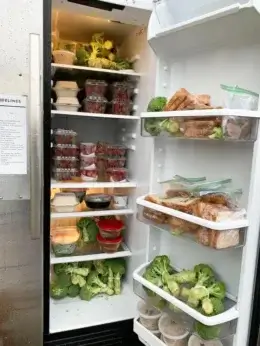

Photo via ATLFreeFridge.
Co-pastor Rev. David Lewicki held a meeting in October 2022 to address the community’s concerns. They have since established rules for refrigerator buyers, including a new boundary on campus, although it’s rare to find no one loitering around the refrigerator. The church also now enforces a no-sleep order, but it still occasionally happens off campus.


North Decatur Presbyterian now provides information about local resources, including temporary housing, legal assistance, employment services, child and pet care to users and has designated parking lots to address traffic issues.
Perhaps the biggest change is that the church now has a dedicated case manager for anyone who needs support. He comes in once a week and sees about four clients on average, helping them get health care, housing and employment.
“The congregation is very supportive of the case manager,” Gathany said. “We’re really trying to help the shoppers through their struggles.” Gathany said that from August 2023 to March 2024, he had nearly 100 meetings with clients and helped several families get off the streets.
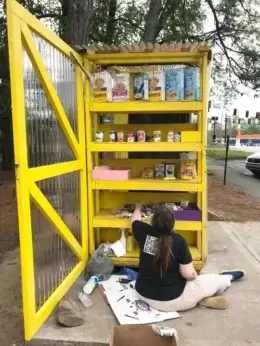

Photo via ATLFreeFridge.
Of course, not everyone who shops at the fridge is homeless. Gathany said the fridge feeds more families who come by car, but they get a lot of single people who come by on foot, and they’re having trouble. 2020 Poverty Rate in Dekalb County Children aged 5-17 years old are 26.6 percentmuch higher than the state average of 18.8 percent. That number rose to 18.6 percent in 2022 (the latest figures available), but it’s still higher than the state average of 16.3 percent. And along with poverty comes food insecurity, which can be caused by a lack of money, long waits for SNAP benefits, or lack of transportation.
And, according to Feeding AmericaNumber of food insecure children in Dekalb County where refrigerators are available hovering around 21 percent in 2022 (latest figures available), much higher than the county’s overall rate of 11.2 percent.
“What a lot of people don’t realize is that some of them are from this neighborhood,” Monique said. “Sometimes people feel embarrassed because they don’t have enough money to buy food. The refrigerator is a great place for them to get food.”
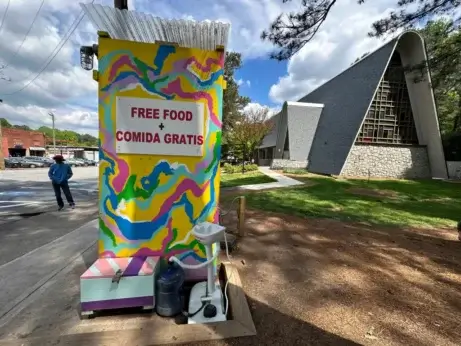

Photo via ATLFreeFridge.
Still, some neighbors who support the refrigerator are hesitant. “The people who congregate there are a deterrent to my donations,” said Kern Thompson, a local resident. “I can only assume I’m not the only one whose donations are cut off by their presence.” The refrigerator has become a gathering place, which in some ways can be both a good and a bad thing when it comes to potential donations.
Medlock resident Monica Morgan said it was one reason she kept donating. “Every time I went there, there was such a need,” she explained. “There were people waiting — families — people who were just down on their luck. But I never felt bad about bringing food. Everyone seemed so grateful.”


Today, nearly four years after the first refrigerator was installed, ATLFreeFridge is still supported.
But it wasn’t without controversy. As of this writing, on July 9, the refrigerator was vandalized again. An unknown person cut the power cord, destroying the refrigerator and leaving it out of commission for nearly a week until volunteers could find a new one. Gathany says she doesn’t know who did it or why, but that doesn’t change the demonstrated need.
“The fact that we even need this refrigerator shows where our society is failing,” Gathany said. “Everybody is struggling, not just the homeless. There will never be anything that 100 percent of the community supports. But the church is doing this because it’s the church’s job.”
